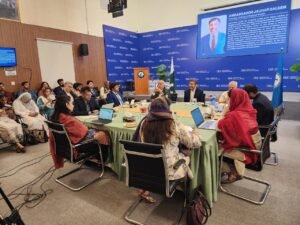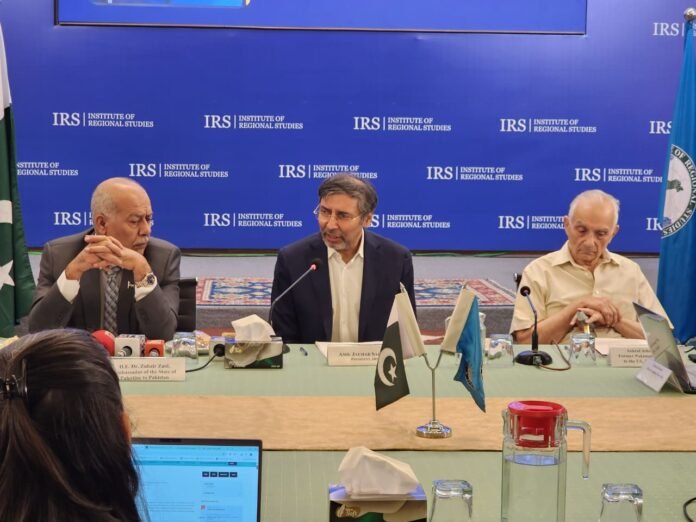The Palestinian Question and Regional Stability: Policy Imperatives for Pakistan and Beyond

Islamabad – 12 September 2025 (MT Team) : The Institute of Regional Studies (IRS) convened a special roundtable discussion on “The Palestinian Question and Regional Stability: Policy Imperatives for Pakistan and Beyond.” The session examined the humanitarian crisis in Gaza, the historical and political dimensions of the Palestinian struggle and its implications for regional stability and Pakistan`s foreign policy. The session brought together Ambassador Zohair Mohammad Hamdallah Zaid, Ambassador Ashraf Jehangir Qazi and senior officials, with the discussion chaired by the President of IRS.
Opening the session, the President of IRS, Ambassador Jauhar Saleem described the unprecedented destruction in Gaza noting that more than 64,000 Palestinians, two-thirds of them women and children, have been killed and 80 percent of buildings have been demolished. Despite UN resolutions, ICJ and ICC rulings and widespread global condemnation, the devastation continues. He reaffirmed Pakistan’s longstanding position in support of a two-state solution, Palestinian self-determination and consistent advocacy in international forums.
Delivering the keynote address, Ambassador Zohair Zaid, the Ambassador of Palestine to Pakistan, offered a moving account of the Palestinian struggle. He emphasized that the conflict is rooted not in religion but in dispossession, with Palestine historically a land for Muslims, Christians and Jews alike. “Palestine is not just a national issue. It is a land for all believers, Muslims, Christians and Jews. Yet it has been turned into an instrument to divide our region and keep it unstable,” he said.
Ambassador Zaid drew attention to the human cost of occupation pointing to mass displacement, systematic destruction of villages and continuing settlement expansion. He stressed that “what threatens Israel most is not our weapons, but our very existence on this land.” Despite the immense suffering, he reaffirmed Palestinian resilience. Ambassador Zaid concluded with a call for decisive international action; “The world should take practical steps. Put sanctions on Israel. This is the only way that can stop Israeli aggression and bring peace.”
Ambassador Qazi broadened the discussion to its global significance. He stated that “if Palestine is allowed to die, it will mark a colossal moral and civilizational failure.” He argued that U.S. and Israeli policies have rendered the two-state solution impossible and asserted that Israel has forfeited its legitimacy by threatening the very existence of the indigenous people of the land. “The only just solution now is the liberation of Palestine in a framework where people of all faiths; Muslims, Christians and Jews live together in justice and dignity,” he concluded.
The session concluded with a discussion in which participants highlighted the gap between political rhetoric and ground realities. Observations were made about the hypocrisy of the European states that continue to fund Israeli settlements despite official recognition of Palestine and about the double standards of international media that amplify isolated incidents in the West while remaining muted on daily Palestinian casualties. Participants agreed that sustained advocacy, solidarity and practical measures will be vital to ensuring that justice and peace ultimately prevail in Palestine.







